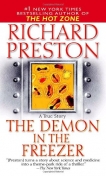BKMT READING GUIDES
The Demon in the Freezer
by Richard Preston
Mass Market Paperback : 304 pages
0 club reading this now
0 members have read this book
the drama of the front lines.?
-Richard Danzig, former secretary of the navy
The first major bioterror event in the United States-the anthrax attacks in October 2001-was a clarion call for scientists who work with ?hot? agents to find ways of ...
Introduction
?The bard of biological weapons captures
the drama of the front lines.?
-Richard Danzig, former secretary of the navy
The first major bioterror event in the United States-the anthrax attacks in October 2001-was a clarion call for scientists who work with ?hot? agents to find ways of protecting civilian populations against biological weapons. In The Demon in the Freezer, his first nonfiction book since The Hot Zone, a #1 New York Times bestseller, Richard Preston takes us into the heart of Usamriid, the United States Army Medical Research Institute of Infectious Diseases at Fort Detrick, Maryland, once the headquarters of the U.S. biological weapons program and now the epicenter of national biodefense.
Peter Jahrling, the top scientist at Usamriid, a wry virologist who cut his teeth on Ebola, one of the world's most lethal emerging viruses, has ORCON security clearance that gives him access to top secret information on bioweapons. His most urgent priority is to develop a drug that will take on smallpox-and win. Eradicated from the planet in 1979 in one of the great triumphs of modern science, the smallpox virus now resides, officially, in only two high-security freezers-at the Centers for Disease Control in Atlanta and in Siberia, at a Russian virology institute called Vector. But the demon in the freezer has been set loose. It is almost certain that illegal stocks are in the possession of hostile states, including Iraq and North Korea. Jahrling is haunted by the thought that biologists in secret labs are using genetic engineering to create a new superpox virus, a smallpox resistant to all vaccines.
Usamriid went into a state of Delta Alert on September 11 and activated its emergency response teams when the first anthrax letters were opened in New York and Washington, D.C. Preston reports, in unprecedented detail, on the government's response to the attacks and takes us into the ongoing FBI investigation. His story is based on interviews with top-level FBI agents and with Dr. Steven Hatfill.
Jahrling is leading a team of scientists doing controversial experiments with live smallpox virus at CDC. Preston takes us into the lab where Jahrling is reawakening smallpox and explains, with cool and devastating precision, what may be at stake if his last bold experiment fails.
From the Hardcover edition.
On December 9, 1979, smallpox, the most deadly human virus, ceased to exist in nature. After eradication, it was confined to freezers located in just two places on earth: the Center for Disease Control in Atlanta and the Maximum Containment Laboratory in Siberia. But these final samples were not destroyed at that time, and now secret stockpiles of smallpox surely exist. For example, since the fall of the Soviet Union in 1991, and the subsequent end of its biological weapons program, a sizeable amount of the former Soviet Union's smallpox stockpile remains unaccounted for, leading to fears that the virus has fallen into the hands of nations or terrorist groups willing to use it as a weapon. Scarier yet, some may even be trying to develop a strain that is resistant to vaccines. This disturbing reality is the focus of this fascinating, terrifying, and important book.
A longtime contributor to The New Yorker and author of the bestseller The Hot Zone, Preston is a skillful journalist whose work flows like a science fiction thriller. Based on extensive interviews with smallpox experts, health workers, and members of the U.S. intelligence community, The Demon in the Freezer details the history and behavior of the virus and how it was eventually isolated and eradicated by the heroic individuals of the World Health Organization. Preston also explains why a battle still rages between those who want to destroy all known stocks of the virus and those who want to keep some samples alive until a cure is found. This is a bitterly contentious point between scientists. Some worry that further testing will trigger a biological arms race, while others argue that more research is necessary since there are currently too few available doses of the vaccine to deal with a major outbreak. The anthrax scare of October, 2001, which Preston also writes about in this book, has served to reinforce the present dangers of biological warfare.
As Preston eloquently states in this powerful book, this scourge, once contained, was let loose again due to human weakness: "The virus's last strategy for survival was to bewitch its host and become a source of power. We could eradicate smallpox from nature, but we could not uproot the virus from the human heart." --Shawn Carkonen
Discussion Questions
No discussion questions at this time.Book Club Recommendations
Recommended to book clubs by 0 of 0 members.
Book Club HQ to over 90,000+ book clubs and ready to welcome yours.
Get free weekly updates on top club picks, book giveaways, author events and more








